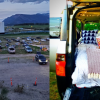The Government of British Columbia has announced sweeping policies to regulate the rapidly-expanding short-term rental market.
The Province says the aim is to crack down on short-term rental platforms like Airbnb and Vrbo, which would create more long-term housing options for British Columbia.
"The number of short-term rentals in BC has ballooned in recent years, removing thousands of long-term homes from the market,” Premier David Eby said today.
“That's why we're taking strong action to rein in profit-driven mini-hotel operators, create new enforcement tools and return homes to the people who need them."

Data from the Province notes that there are around 28,000 active short-term listings in BC, an increase of 20% from a year ago, and more than 16,000 entire homes are being listed as short-term rentals for the majority of a calendar year.
It’s been an ongoing surge since the COVID-19 pandemic that has put BC’s short-term rental market at an all-time high.
Housing Minister Ravi Kahlon says it’s creating “serious challenges,” not only in BC but around the world.
"Operators with multiple listings are taking homes off the long-term market to make big profits while people pay the price - it can't go on like this,” he explained.
“The legislation is comprehensive and designed to target areas with high housing needs. It's strong action and a thoughtful approach to tackle the growing short-term rental challenge and deliver more homes for people."
BC’s new legislation to crack down on short-term rentals focuses on three key areas:
- Increasing fines and strengthening tools for local governments.
- Returning more short-term rentals to long-term homes.
- Establishing provincial rules and enforcement.
New rules will require short-term rentals in BC in municipalities with a population of more than 10,000 to be offered only in a principal residence, which does include one secondary suite or laneway home.
They will also see a new provincial registry created, which short-term rental platforms like Airbnb and Vrbo will need to share data with the Province through.
It will also allow the Province to provide that information to local governments for enforcement and support of provincial and federal tax auditing.
A provincial short-term rental compliance and enforcement unit would be launched to ensure rules are being followed.
Communities under 10,000 people, 14 resort regions, mountain resort areas and regional district electoral areas are expected to be exempt from these new regulations.

The Province estimates that stricter rules on how short-term rentals are operated and enforced will contribute to thousands of homes being returned to the market in the coming years.
At the same time, they’re meant to give smaller communities and areas that are heavily reliant on short-term-rental-related tourism some flexibility.
“These areas will be able to choose to opt into the principal residence requirements depending on housing pressures in their communities,” notes a release from the Province.
According to the Province, the short-term rental market in BC is dominated by a small segment of profit-driven operators.
Research from McGill University shows that the top 10% of hosts earn nearly half of all revenue and nearly half of all operators have multiple listings.
The legislation announced today builds on bylaws already introduced in around 30 municipalities around BC, including Vancouver, Victoria and Kelowna.
Kelowna Mayor Tom Dyas says the proposed changes lay a strong foundation for municipalities to build upon through their own bylaws and regulations.
“This is an important step to help ensure there is a diverse housing supply available for our rapidly growing city,” he claimed.
“The need is great: as an example, we hear regularly from our tourism industry of the challenge their staff have in finding housing and this will go a long way to change that situation, and many similar housing challenges in our community."
The proposed legislation will not apply to hotels and motels, while regulations are also being drafted to exempt properties like timeshares and fishing lodges.
The bill was immediately passed in the legislature and moved to second reading on Tuesday.
For a more in depth breakdown of today’s announcement, click this link.
















